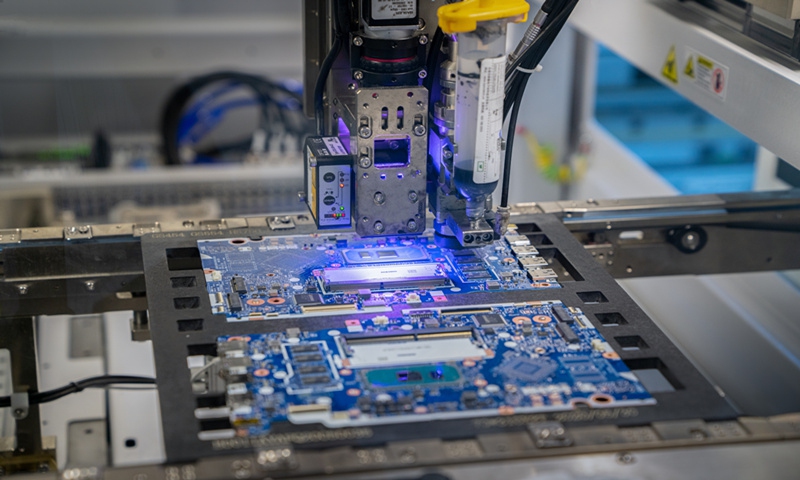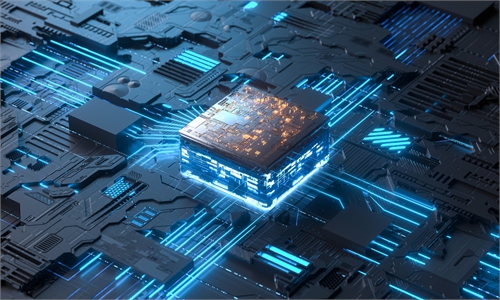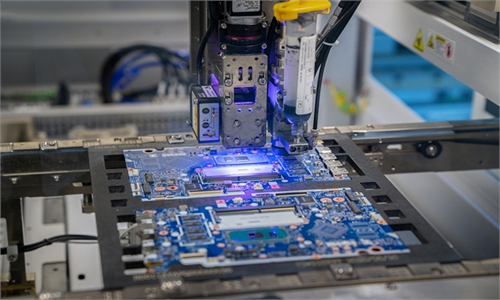
A chip manufacture machine Photo: VCG
Despite Washington's relentless efforts to restrict the development of the Chinese chip industry, US chipmaker NVIDIA said on Monday that it is expanding collaboration with Chinese enterprises. Experts noted that the "small yard and high fence" tactic of the US will eventually backfire on its own tech advancement.
Chinese companies such as BYD, Hyper and XPENG have decided to adopt NVIDIA's DRIVE Thor - an in-vehicle computing platform created for generative artificial intelligence (AI) applications - NVIDIA said in a statement on Monday as the company's annual GPU Technology Conference (GTC) kicked off.
"BYD, the world's largest electric vehicle maker, is expanding its ongoing collaboration with NVIDIA from the car to the cloud," read the statement.
"In addition to building its next-generation EV fleets on DRIVE Thor, BYD plans to use NVIDIA's AI infrastructure for cloud-based AI development and training technologies, along with the NVIDIA Isaac and NVIDIA Omniverse platforms to develop tools and applications for virtual factory planning and retail configurators," the AI chip industry leader said.
At the GTC, two other Chinese automakers - Hyper and XPENG - also announced plans to use the NVIDIA DRIVE Thor platform as the AI brain for their next-generation EV fleets, joining Li Auto and ZEEKR, which previously made similar announcements.
Also at the GTC, technology giant Lenovo announced new hybrid AI solutions, built-in collaboration with NVIDIA "that deliver the power of tailored generative AI applications to every enterprise and cloud," according to a statement Lenovo sent to the Global Times on Tuesday.
Amid the US government's ongoing restrictions on chip exports to China and crackdown on China's high-tech industries, NVIDIA has employed various strategies to ensure it doesn't sever its ties with the Chinese market, Ma Jihua, a telecom industry analyst, told the Global Times on Tuesday.
Previously, NVIDIA tried to hold onto its market share by exporting "downgraded" chips to China, but it faced a lukewarm reception. Now, NVIDIA is taking a different approach by expanding technical collaboration with Chinese companies. This approach could allow NVIDIA to maintain its market presence without violating certain restrictions imposed by the US government, Ma said.
This situation clearly showed that the US business sector is reluctant to "decouple" from China, highlighting the resilience of economic and technological cooperation between the two countries, Ma stressed.
In recent years, the US government has spared no effort in suppressing China's high-tech industry, with semiconductors as a focal point. From restricting American companies' chip exports to China to luring or pressuring its so-called allies to form small cliques, the US has attempted to isolate China from the global chip value chain.
However, "China is one of the major semiconductor markets in the world. To fragment the market, destabilize global industry and supply chains, and stymie efficiency and innovation serves no one's interests," Chinese Foreign Ministry spokesperson Mao Ning said at a press briefing on February 27.
What has happened shows that "small yard and high fence" tactics will not stop China's innovation-driven development, nor will they do any good to US companies or the entire semiconductor industry, Mao said.
In the fourth quarter of 2023, Chinese chip manufacturer HiSilicon's shipment volume reached 6.8 million units, up more than 50 times year-on-year, media reports said, citing data from Canalys.
US restrictions on chip exports have created some market opportunities for Chinese companies. Under the premise of equivalent performance, domestically produced equipment is more secure, sustainable and has lower risks, Ma said.
The Biden administration's efforts to curb China's high-tech industry have failed to halt the advancement of China's chip sector. Instead, they have only accelerated the drive for independent research and domestic substitution, pushing China further toward self-reliance in its products, Ma said.


